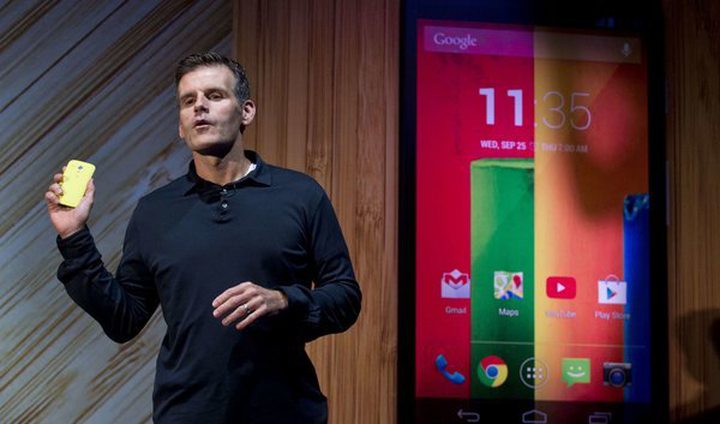Motorola to Offer Moto G Smartphone Aimed at Emerging Markets

Sales of Motorola’s high-end smartphone, the Moto X, have been slow. Now the company is targeting the low end of the market with a less expensive phone, but with a major limitation — Motorola won’t release the new phone in China, the biggest market for low-end phones in the world.
The lower-priced phone, Moto G, was announced by the company on Wednesday. It costs at least $180 without a contract, and Motorola thinks it will appeal to people in places like Brazil, Chile and Peru, where there are more than 500 million potential customers.
Much of its appeal for those customers would be Google’s Internet services that are embedded in the phone. But in China, the government blocks some Google services, including Play, Google’s official online store, making Motorola’s new smartphone far less smart there.
“Our ability to compete there is a bit constrained,” said Dennis Woodside, Motorola’s chief executive, in an interview. “Moto G won’t be offered in China, initially at least.”
Still, Motorola believes the phone will appeal to enough people outside China to be a success. Unlike many cheap smartphones on the market, the Moto G will have a big high-resolution screen and run the latest Android software to support the latest apps on the market. It has a 4.5-inch screen, which puts it right between the smaller iPhone 5S and the larger Galaxy S4 from Samsung Electronics.
There are some trade-offs that come with making the phone less expensive. The Moto G is bulkier than many popular smartphones — weighing five ounces, it is more than an ounce heavier than an iPhone 5S, which costs $650 without a contract.
The Moto G also lacks a special feature that made Moto X, its higher-priced sibling, stand out: the ability of the device to continually listen for a user’s voice and quickly react to commands.
But the low-end smartphone’s goal is not to be a flashy piece of gadgetry representing the latest innovation. It is an effort by Motorola to return to growth by reaching as many people as possible, Mr. Woodside said.
“Google’s mission is to organize all the world’s information and make it universally accessible,” he said. “For Motorola, one of the things we’re trying to do is create a very high-quality mobile Internet experience over time for hundreds of millions of people.”
Smartphones have surpassed the traditional cellphone in sales in the United States and some parts of Europe, and many manufacturers are looking overseas for growth. While Apple and Samsung make most of the profit in the worldwide smartphone market, the makers of cheaper phones — including Huawei, Yulong and ZTE of China, and Micromax and Karbonn of India — are selling well in emerging markets where high-end smartphones are not popular.
However, like other American companies, Motorola will most likely face tough competition overseas, where many manufacturers have been selling low-end smartphones for years for less than the Moto G. Details about the Moto G leaked online ahead of Motorola’s official announcement, and some analysts who looked at the specifications did not find it very compelling.
“It’s heavy, thick and it’s pretty expensive,” said Tero Kuittinen, an analyst for Alekstra, a mobile trends research firm.
Along with the bulkier size, the $180 price tag is still not as aggressive as what some other manufacturers have released in the low end of the market, Mr. Kuittinen added. For example, Samsung’s Galaxy Young, which weighs 3.4 ounces and has a 3-inch screen, costs $100 on Amazon.com. Chinese handset makers like Huawei and ZTE also make Android phones that cost as little as $100.
Motorola says it will sell the Moto G at a profit. The device will go on sale Wednesday in Brazil and parts of Europe, and then in January in other parts of the world like India and Southeast Asia. The phone will also go on sale in January in the United States, where the company thinks the device could appeal to people who cannot afford a fancy smartphone, particularly children.
The success of the Moto G will largely depend on how aggressive Motorola and Google market it, said Chetan Sharma, an independent telecom analyst who does consulting for carriers. Motorola will not only have to advertise the phone, but it will also have to persuade the carriers to train retail workers to sell the device to consumers who walk into the store, he said.
But along with being unable to sell phones in China, Motorola faces another big limitation. Unlike most manufacturers, Motorola, which Google bought last year for $12.5 billion and then retooled, has to be cautious about its approach to selling hardware. If it were too aggressive — for example, if it were to sell the smartphones at a loss and make the money back later with ads — it could harm Google’s partners who sell phones using Google’s Android operating system, which could eventually move people away from Android devices.
“That’s the tight line they always have to walk,” Mr. Sharma said. “How hard and how far do they push their own devices?”



